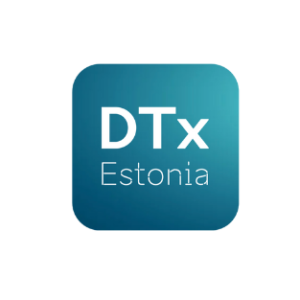Programm
26th of August – Tallinn
| 9:00-11:30 | Introduction to the week and Estonian Health Tech
| E-Estonia Briefing Centre |
| 11:45-13:30 | Developing systems, integrations in healthcare and possibilities/use-cases of AI (together with TEHIK)
| Nortal |
| 14:00-17:00 | Digital health: Current situation, bottlenecks in the system and possibilities for cooperation and growth
| TalTech, Mektory |
| 17:15 | Organised bus ride to Tartu | |
| 19:30 | Arrival in Tartu |
27th of August – Tartu
| 9:00-10:30 | Visit to Estonian Biobank
| Estonian Biobank Riia 23b, 51010, Tartu |
| 10:45-15:45 | Visit to Tartu University Hospital
Icosagen stands as a premier Estonian biotechnology and drug development enterprise. Renowned for its scientific excellence, high-growth trajectory and knowledge-intensive approach. Icosagen operates as a Contract Research, Development, and Manufacturing Organization (CRDMO), pioneering novel technologies and offering antibody identification and protein production services to the pharmaceutical and biotechnology sectors. | Tartu University Hospital |
| 16:00-17:00 | Visit to Icosagen (organised bus ride from Tartu University Hospital to Icosagen) | Icosagen Eerika tee 1, Õssu, 61713 Tartu maakond |
| 18:00 | Networking / Community meetup – EstBAN Tartu x DeepTech Pub – Health edition This meetup brings us together to foster connections among investors, Healthtech, Biotech, Deep tech startups, and community builders across Estonia as well as guests of Estonian Health Tech Week. The event is co-hosted by Startup Estonia, EstBAN, Tartu Biotechnology Park and Sparkup Tartu Science Park as a joint meetup during Estonian Health Tech Week. | TBC |
28th of August – Tartu
DTx New Nordics conference https://dtxnewnordics.com
Kammivabriku sündmuskeskus, Teguri 26, 50107 Tartu
29th of August – Tartu
| 10:00-10:30 | ScanBalt/EDAH workshop: Creating Value Through Health Data
| VSpa Hotel Conference Centre (Riia 2, 51004 Tartu) |
| 10:30-12:00 | Including data donors in the value generation flow – Moderator: Maciej Drozdz, founder of SpringLab.tech Progress in discovering biological processes that can be addressed by pharmacological intervention (or other therapeutic methods) is dependent on wide access to human biological material and information. The patient consent agreement is the basic legal agreement between the donor and the biobank and the ultimate user of the patient biomaterial or data resulting from it. There is a conflict of interest between the owner of the biological material and the user. The current legal and technical framework does not allow patients (or biobanks on patients’ behalf) to dynamically adjust (grant or withdraw) permits for a unit of information or biomaterial. The potential value of information contained in biological material is enormous and can lead to key observations that for example to the discovery of molecules that will become drugs and thus generate substantial revenue. At the same time, the current modus operandi/business model of biobanks is based on the voluntary, altruistic behaviour of people who, under certain conditions, agree to make their biological material available to the biobank collection. Is this controversy solvable? The session is aimed to discuss whether and how we can use modern methods of information management (e.g. blockchain/NFT/AI) in generating an economic model and information technology tools to include donors of biological material in the flow of value generated through the use of their material while enabling users of this material a necessary level of access. | |
| 12:00-12:45 | Lunch | |
| 12:45-14:15 | Secondary use of health data and IP rights in the EHDS – Moderator: Elina Drakvik, Senior Lead at Sitra (Finnish Innovation Fund) The session will focus on discussing how the European Health Data Space (EHDS) should be implemented optimally, promoting access to data and boosting research and innovation while also addressing IP rights, including trade secrets, through necessary measures to preserve confidentiality when sharing data for secondary use. The EHDS text specifically stipulates that electronic health data containing protected IP and trade secrets should be made available for secondary use but with necessary measures to preserve confidentiality, prescribing this role to Health Data Access Bodies (HDABs). Furthermore, the text stipulates that if measures are deemed to be insufficient to ensure the protection of IP rights or the confidentiality of the data, the HDAB shall refuse the granting of the relevant health data access permit to the health Data User. Practical measures and tools will be needed for HDABs on how to safeguard IP rights, as these rights have effectively fuelled the transformative development and advancements in healthcare and medicine until now. The session will take a deep dive into the subject matter through short presentations and a panel discussion bringing up the views of industry, a Member State and HDAB and discussing first ideas on how to move forward in this complex area in a constructive manner. | |
| 14:15-14:30 | Coffee break | |
| 14:30-16:00 | The potential of AI for the early diagnosis of Alzheimer’s – research, law and political standardization – Moderator: Oliver Stenzel, Head of Digital Health Working group at ScanBalt Artificial intelligence can be a blessing for the medicine of the future. We can use it for the development of new therapies as well as for the early diagnosis of diseases or the long-term care of patients. Personalized medicine in particular needs the ability to analyze large volumes of data and develop tailored solutions. But there are also high hopes for AI in complex widespread diseases such as Alzheimer’s disease – in particular, a timely diagnosis should be made easier and faster by analyzing and linking a wide range of everyday parameters. For some, this is a blessing, while others see it more as a threat. To fulfil the expectations placed on it, AI must penetrate deep into the reality of our lives – appropriate legal and political regulation is just as necessary as a broad ethical discourse. In our session, we will approach this complex topic from different angles. |
Community partners



